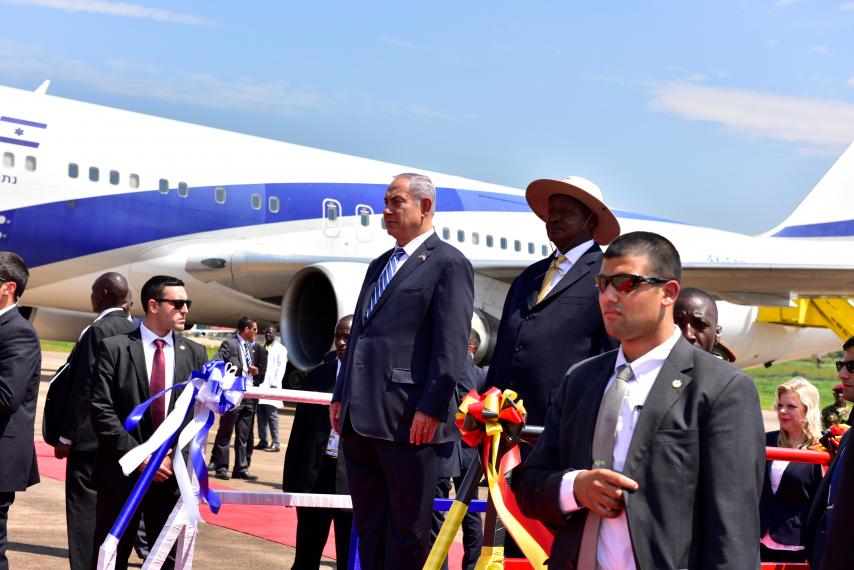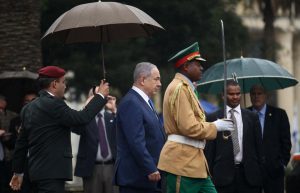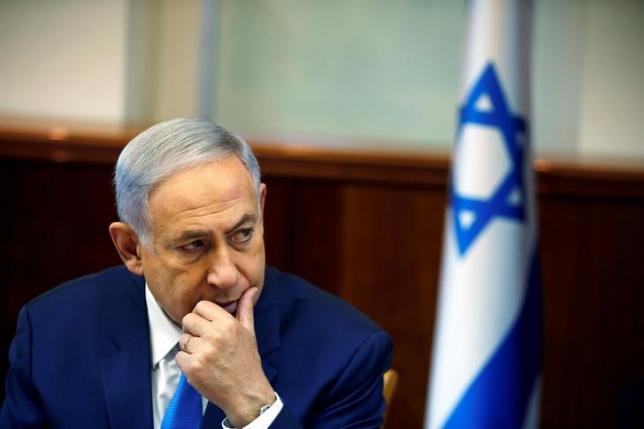
Diplomatic relations between Israel and African countries date back to the 1960s, but ties with most nations in the continent were severed in the wake of the 1973 Arab-Israeli war.
Relations were also not helped by Israel’s friendship with the apartheid regime in South Africa before its fall in 1994.
Before his East Africa visit, Netanyahu had told the cabinet that the trip was “part of a major effort on our part to return to Africa in a big way.
Benjamin Netanyahu has arrived in Uganda at the start of a four-country trip to East Africa, becoming the first Israeli prime minister to visit the continent in at least 30 years.
Arriving at Uganda’s Entebbe’s airport on Monday, Netanyahu said Israel’s raid to end a hostage crisis 40 years ago, in which his brother was killed, “changed the course” of his life, Al Jazeera’s reported.
What is Netanyahu doing in Africa?
By visiting Africa, the Israeli premier wants to end decades of hostility and convince African countries to stop voting against Israel at the United Nations.
Netanyahu also seeks to cast off Israel’s pariah status in the African continent as he faces growing criticism from Western allies over the dim prospects for a resolution to the decades-old Israeli-Palestinian conflict.
In the United Nations, Israel is a constant subject of rebuke over its settlement enterprise in the occupied West Bank and other violations, including its crippling blockade of the Gaza Strip.
One of Netanyahu’s objectives is to convince African nations not to vote against Israel.
“In the UN there are many [resolutions] which target Israel and we want to change this with the help of the Africans,” Arye Oded, a former Israeli ambassador to Kenya and Uganda, told German broadcaster DW.
Israel’s relationship with African nations has historically been fraught because of support for the Palestinian cause from many countries on the continent.
The uneasy history of relations is evident in the fact that no Israeli leader has visited sub-Saharan Africa since Yitzhak Shamir in 1987.
Scores of African countries, including all the countries that Netanyahu is visiting, cut ties with Israel following the 1973 Israeli-Arab war only to restore them in the 1990s.
Israel’s ties with African countries were further frayed because of its historic support for the apartheid regime in South Africa.
At a recent conference on Africa-Israel ties, Israeli foreign ministry official Yoram Elron noted Tel Aviv’s need for support from African nations in international forums.
“Today relations with the African continent are high on our foreign policy agenda,” he told dozens of African dignitaries and diplomats.
Questioned about Israel’s ties to apartheid South Africa, Netanyahu said: “It stopped under my predecessors and I am glad it did.”
Pressed to state whether he had any regrets about the cooperation, he added: “Yeah, and I am glad it [ended].”
Netanyahu began a four-day tour that will encompass visits to Uganda, Kenya, Rwanda and Ethiopia, in what he has described as Israel’s attempt to “return to Africa in a big way.”

Here are five reasons why Netanyahu is coming to Africa.
1. To pay his respects
Jonathan Netanyahu, the elder brother of the Israeli leader, died in Entebbe in Central Uganda in 1976 during a hostage rescue operation. An Air France flight from Tel Aviv to Paris was hijacked by Palestinian and German militants, who ordered the pilot to divert to Benghazi in Libya and then Entebbe, where they were offered shelter by Ugandan dictator Idi Amin. The Israeli-led operation freed 102 of 106 hostages, who had been held for more than a week at the airport, but Netanyahu’s brother was shot dead during the raid. Four hostages, at least seven of the militants and 20 Ugandan troops were also killed.
Visiting the scene of the raid on Monday, Netanyahu said he had learned from his brother that “clarity and courage” are required to overcome extremism. “When terrorism succeeds in one place it spreads to other places, and when terrorism is defeated anywhere it is weakened everywhere. This is why Entebbe…was a victory for all humanity,” said the Israeli PM, according to the BBC.
2. To restore shaky foundations
The fact that no Israeli head of state has visited sub-Saharan Africa since Yitzhak Shamir in 1987 is testament to the rocky history between Israel and the continent. Following the 1973 war between Israel and a coalition of Arab states led by Egypt and Syria, scores of African countries—many under Arab influence—cut ties with Israel. Indeed, the four countries Netanyahu is visiting all severed relations with Israel following the war, only to restore them in the 1990s. The country’s ties with black African countries have also suffered due to its historic support for the apartheid regime in South Africa.
Netanyahu admits that his visit is an attempt to restore these relations. “Israel was blacklisted in Africa, basically kicked out by political pressure from many, many countries in which we were involved in the 60s and 70s and it took a while to change,” said Netanyahu in an interview with Ugandan independent newspaper the Daily Monitor.
3. To do business and get some favors
Netanyahu will lead at least two business forums during his trip, one in Kenya and one in Ethiopia, while also meeting with each head of state individually. Israel is also expected to launch a $13 million development package for African states, which will including assistance in the sectors of agriculture, health and domestic security.
Israel has also reached a settlement with two undisclosed African countries to resettle around 40,000 migrants and refugees from Sudan and Eritrea, who entered the country through Egypt. The countries are reported to be Uganda and Rwanda, according to the Financial Times.
4. To gain some partners against the West
The continuing stalemate in the Israel-Palestine conflict has proved detrimental to the former’s relations with Western countries and institutions such as the United Nations, which have condemned Israel’s construction of settlements in the West Bank and the blockade of the Gaza Strip . One possible motivation of Netanyahu’s trip is to drum up support within the region for Israel’s stance on the issue. “In the U.N. there are many [resolutions] which target Israel and we want to change this with the help of the Africans,” Arye Oded, a former Israeli ambassador to Kenya and Uganda, told German broadcaster DW.
5. To share past grievances
One particularly poignant stop on Netanyahu’s agenda is a visit to the Kigali Genocide Memorial, where the remains of more than 250,000 victims of the Rwandan genocide are interred. The 1994 genocide saw Hutu extremists kill more than 800,000 Tutsis and moderate Hutus in a systematic attempt to exterminate an entire ethnic group. Since some 6 million Jews were killed by the Nazi Germany regime during World War II, Netanyahu will no doubt be able to empathize with those affected by the genocide. Rwanda’s ambassador to Israel, Joseph Rutabana, has previously said that the East African country holds up Israel as a template of how to recover from a tragedy on such a scale.

When he touched down in Uganda on Monday, Benjamin Netanyahu became the first Israeli Prime Minister to visit sub-Saharan Africa in almost 30 years.
The Entebbe rescue is widely seen as one of Israel’s greatest military successes. It also was a monumental event for Netanyahu, as the death of his brother, Yonatan, pushed him into the public eye and on a track that would take him to the country’s highest office.
“This is a deeply moving day for me,” he said. “Forty years ago they landed in the dead of night in a country led by a brutal dictator who gave refuge to terrorists. Today we landed in broad daylight in a friendly country led by a president who fights terrorists.”
Netanyahu travelled to Uganda with soldiers and pilots who were members of the rescue team.
An Israeli band played sombre tunes at the airport on the shore of Lake Victoria, to mark the anniversary of the Israeli rescue mission, during which three hostages were killed.
Aside from Uganda, Netanyahu is also scheduled to visit Kenya, Rwanda and Ethiopia.
In Uganda, Netanyahu will meet African leaders to discuss further cooperation and business opportunities, in a special summit to be attended by President Yoweri Museveni, as well as leaders from Kenya, Rwanda, South Sudan, Ethiopia, Zambia and Tanzania.
On June 27, 1976, an Air France plane with 248 passengers was hijacked by two Palestinian and two German hijackers.
Most passengers were released, except the Israelis. The Israelis were freed and airlifted to Israel in a July 4 raid by Israeli commandos. During the operation, Kenya allowed Israeli forces to use its airspace, refuel and treat injured hostages.
“I am not sure people in this country understand how deep is Israel’s appreciation of Kenya’s role in the 1976 Entebbe raid,” Yahel Vilan, the Israeli ambassador to Kenya, told Al Jazeera. “People of my generation and older remember it as if it happened yesterday.”
Al Jazeera’s Charles Stratford, reporting from Entebbe, said that besides the obvious symbolism of Netanyahu’s visit, diplomacy, business and security issues were high on the agenda.
“The Israeli prime minister has said words to the effect of being determined to get more friends in Africa, more allies on the continent,” Stratford said.
Seeking trade partners
In Kenya, Rwanda and Ethiopia, Netanyahu is expected to separately meet the nations’ heads of state and security and economic leaders, and to speak before the Ethiopian Parliament.
The trip comes at a time when Israel is launching a $13m aid package to strengthen economic ties and cooperation with African countries, said Netanyahu’s office. Israel would also provide African states with training in “domestic security” and health, it added.
“With the visit of the prime minister, I believe that the relations of Kenya and Israel will be solidified and expanded,” Albert Attias, chairman of the Jewish community in Kenya, told Al Jazeera.
“This will give opportunities to the two countries expand their bilateral activities and add value to both Kenya and Israel,” the businessman added.
Netanyahu is accompanied by approximately 80 business leaders from more than 50 companies in order to forge commercial ties with African companies and countries.
Setting off on his visit to East Africa, Netanyahu told his Cabinet that “Israel intends to return to Africa” because the diplomatic links have “very important implications vis-à-vis varying our international alliances and international relations, which are expanding to the major powers in Asia, to Russia, to Latin America and—of course—to the African continent.”
One of the goals of the five-day trip was to rally support for restoring Israel’s observer status at the African Union, which was revoked in 2002 at the behest of the late Libyan dictator Muammar el-Qaddafi.
The proposal garnered support from several of Netanyahu’s hosts, including Kenyan President Uhuru Kenyatta, who described it as “not just good for Kenya” but also “good for Africa” and “good for global peace.” The Kenyan leader cited the common interest that his country and its neighbors had with Israel in combating Islamist terrorism.
In fact, Israel will be helping Kenya build a 440-mile wall along its border with Somalia to prevent Al-Shabab and other militants from crossing that frontier. Kenyatta also announced an agreement between the two countries to share intelligence.

In a similar vein, Prime Minister Hailemariam Desalegn of Ethiopia not only promised to work to upgrade Israel’s position at the African Union, he declared that “the East African corridor has the huge potential for cooperation with Israel, and we need to engage Israel,” adding that those African countries that disagree with Israel on certain issues had no right to veto the rest of the continent’s cooperation with the Jewish state.
The Ethiopian leader also publicly thanked Israel for its support in securing for Africa’s second most populous country a rotating seat on the U.N. Security Council beginning next year and promised to reciprocate by helping Israel in international forums.
In fact, although it has gone largely unremarked, better relations with African countries have contributed concretely to Israeli diplomatic successes like the failure in September 2015 of the proposed International Atomic Energy Agency resolution that would have mandated inspections of Israeli nuclear facilities.
Four African countries—Burundi, Kenya, Rwanda and Togo—voted against the measure, 17 others abstained, eight were absent and only seven sub-Saharan African countries voted against Israel.
Beyond the political stakes, there are also increasing economic and commercial ties between Israel and its African partners, as underscored by the representatives of more than 50 Israeli firms who accompanied Netanyahu on the trip. In fact, in many cases, the investments made by Israeli business—especially in the water, agriculture, energy and information technology sectors of several of Africa’s emerging economies—helped pave the way for the renewal of diplomatic cooperation.
In Rwanda, for example, an Israeli-American company, Gigawatt Global, is behind a year-old solar power plant that boosted the country’s generation capacity by 6 percent, providing efficient renewable energy to some 15,000 homes. The plant, East Africa’s first utility-scale photovoltaic facility, was a finalist for 2015 U.S. Secretary of State’s Award for Corporate Excellence in the category of environmental sustainability.
Israeli official development agencies as well as private charities have also ramped up their activities in Africa. Since it was founded eight years ago, the Israeli nonprofit Innovation: Africa has used Israeli solar and water technologies to deliver clean water to nearly 1 million rural villagers in seven African countries (the Democratic Republic of Congo, Ethiopia, Malawi, Senegal, South Africa, Tanzania and Uganda).
In 2012, a unique partnership was launched between the Ethiopian Ministry of Agriculture, the U.S. Agency for International Development and Israel’s Agency for International Development Cooperation to promote economic growth in rural areas by strengthening smallholders’ production of fruits and vegetables with market potential; in May 2016, this tripartite development program, built on an earlier bilateral Israeli-Ethiopian initiative, was extended for another three years.
Following his meeting with Netanyahu, Rwandan President Paul Kagame, whose country has had, since 2014, a partnership agreement with Israel establishing a forum for regular consultations between the two countries and boosting investment, mentioned several areas that were ripe for future cooperation:
There are new areas as we go forward such as water management. Israel has a lot of capacity that not only Rwanda but the rest of Africa can benefit from. Israel manages scarcity of water resources better than anyone in this world.… Israel has made huge advancements in areas of technology of agriculture that has multiplied the productivity better than you see anywhere else. We are very keen on tapping into this and other areas of capacity building such as areas of infrastructure, energy and other aspects.
After wrapping up his week with an address to the Ethiopian parliament in which he invoked King Solomon and the Queen of Sheba, Netanyahu tweeted, “Israel is coming back to Africa; Africa is coming back to Israel.”
Whether the romance will be sustained this time remains to be seen, but what is certain is that an exciting new chapter in a very old story is being written.
Israeli exports to Africa totaled about $1 billion last year, about 2% of its total exports.
With insurgencies and Takfiri militancy growing across Africa, including Qaeda-affiliated al-Shabaab and Daesh-linked Boko Haram, Israeli leaders are looking to sell advanced military equipment to the continent, the New York Times wrote.
The move comes as Israeli exports to traditional markets in the EU and US have become volatile, Ohad Cohen, head of foreign trade at Israel’s Ministry of Economy and Industry, told the Times.
“We are trying to diversify our exports through channeling efforts to markets that are growing more rapidly than [others],” he said. “Africa is one of them.”
Refugee evictions
Netanyahu is also expected to discuss the eviction of around 40,000 migrants and refugees from Sudan and Eritrea who entered Israel through Egypt.
According to the British daily Financial Times, Israel has reached an agreement with Uganda and Rwanda to resettle the refugees.
Last year, Israel ordered African migrants to choose between deportation and indefinite imprisonment. About 2,000 Africans are reportedly held in Israeli prisons.



